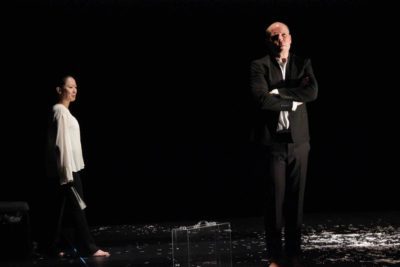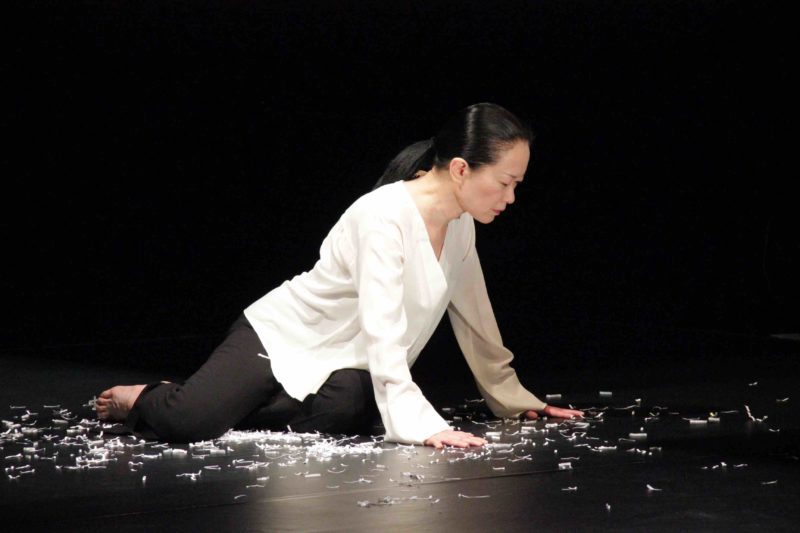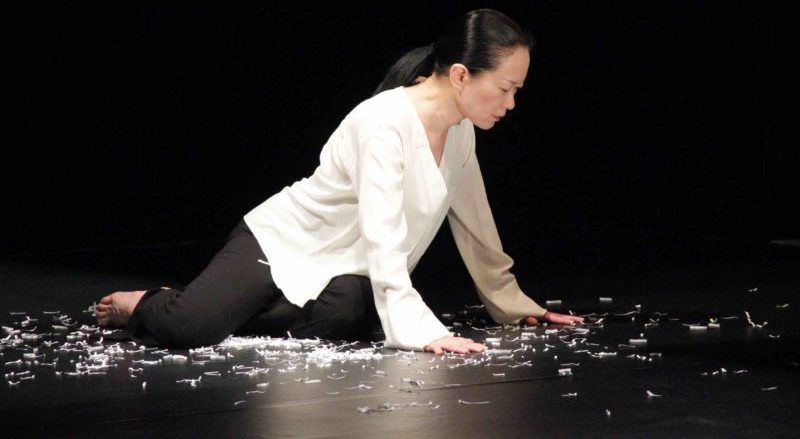INTERVIEW: Classic noh play comes to Japan Society

Hanjo, the classic noh play from playwright Yukio Mishima, has been revived by SITI Company and Leon Ingulsrud, who will present their new production Dec. 7-9 at New York City’s Japan Society. The play tells the story of Hanako, a young woman who waits endlessly for her lover. The drama touches upon the themes of love, loss and betrayal.
“It was a play that I had been aware of for a long time because I was born and raised in Japan, and so Japanese culture had always played an important part of my life,” said Ingulsrud, co-artistic director of SITI, who wrote a new English translation of the play. “The aesthetics and philosophies behind noh theater [were] very interesting to me, but it’s very difficult to find relevance for those ideas in a modern context. And Mishima, having written these modern noh plays in the ‘50s, had always been really fascinating to me.”
Ingulsrud said a previous translation was excellent but felt a bit dated. He was interested in finding a way to update the words for a 21st-century audience, making the playwright’s original intentions sound more contemporary.
“We are putting the English and the Japanese right up against each other, and so in a certain sense they needed to match grammatically in ways that aren’t necessary if you’re just doing it in English,” he said. “And so we had to adjust the language a little bit to make that work a little bit more seamlessly, but it’s a play that I’ve been thinking about for a really long time. I first started working on it almost 10 years ago, so it’s been a long time coming.”
In the show, there are three characters, and the actors will actually alternate in the roles in each of the Japan Society’s three performances. This meant that during the rehearsal and development process, Ingulsrud needed to employ the help of all three actors when trying to address a change with one character. After all, they will all become that character at least once in this limited run.
“Every time we make an adjustment, an actor, as would be normal in any rehearsal, makes a discovery in a moment, or we find something that clarifies it,” he said. “Then the other two actors have to kind of agree with that, and we have to find a way to feed that into the other two iterations. And that’s been very interesting. Just over this weekend, we had a section, a really critical moment in the play, and we got into a whole discussion about how to take it further. It gets really tricky because in a normal context the actor who is playing that part would be able to just make a choice, and, as long as the director [says] I’m OK with that choice, then that’s it. But we have to find a way essentially for all three of the actors and myself to agree with it.”
As SITI built the play, they stuck to an unconventional process known as “workspace.” That means instead of waiting for a commission, they started working on the production on their own.
“We’ve gotten grants from a couple foundations, the National Endowment for the Arts, to do this workspace thing to work on a number of plays, so we’ve worked on it in little spits, little stretches, two weeks here, a week there, a day here,” he said. “Every time we touch it, we’re finding big things. I think it’s going to continue to be an exploration as we go forward.”

As far as the audience, Hanjo will be performed for both noh experts and noh newcomers alike. Everyone is welcome to learn the story of Hanako.
“There are people who are real aficionados of noh in Japan who would go all the time,” Ingulsrud said. “There isn’t the opportunity to do that here. Lincoln Center has been very good about presenting noh, and the Japan Society often does it, too. But I’m assuming that most of the people, even at the Japan Society, … are not going to have a great deal of familiarity with noh, and so the production is not designed to require that. I like to think that if you know something about noh, you will understand some of the choices through that lens and be able to appreciate certain things, but I’m certainly hoping that it speaks fully to people who don’t know it. My lighting designer, Brian Scott, who did both lights and set, he doesn’t have very much experience with noh and kind of intentionally kept himself in the position of speaking for the non-noh people in our process. So that’s been very, very helpful.”
By John Soltes / Publisher / John@HollywoodSoapbox.com
SITI Company’s production of Yukio Mishima’s Hanjo, with a new English translation by Leon Ingulsrud, will play Dec. 7-9 as part of the NOH-NOW series at the Japan Society in New York City. Click here for more information and tickets.

